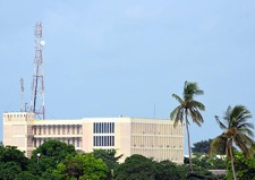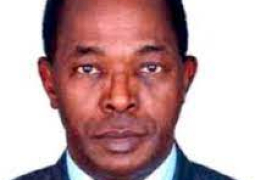
There is this betting company in the area where I live and any time there is a big football match going on, the place is packed with football lovers and enthusiasts. They literally block the road as they bet for their team and watch the football game. And this happens all over the world, Ghana not an exception. Anytime I drive pass this place, I ask myself, “where do these people get all these monies from to bet?”, “how do the betting companies account for these monies and the right amount of tax assessed and paid to the tax authorities?”
Sport is the only activity in the world which unites even enemies for a period of time. During these periods everybody is happy and forgets about their problems and troubles. This phenomenon has created a lot of opportunities for people and the criminal who want to launder dirty money is no exception.
For those of us without any knowledge about sports betting, let me take this opportunity to explain what it is. Sports betting involve punters predicting the outcome of matches or games and getting their bets to correspond with the stakes. If the predictions are correct, the bets are rewarded with stipulated winning. Simply put, it is the prediction of the results in sports and placing a wager on the outcome. The betting happens in almost every sport you can think about; be it boxing, wrestling, horse racing, cycling, basketball, cricket, tennis and almighty football.
Since the financial and non- financial institutions in Ghana are highly regulated by their various regulators, criminals are looking for other places to wash their ill-gotten money and it seems Ghana is the best place for such things. Have we asked ourselves, as a nation, why there are a lot of betting companies coming to Ghana to operate? Yes, it might be because of our stable political environment and/or economic potentials but other criminal reasons exist too, which we cannot sweep under the carpet.
A report by Reuters in May 2014 suggests that criminals use sports betting to launder USD 140 billion each year and also cited lack of effective regulation as one of the vulnerabilities.
The sports betting industry is vulnerable to money laundering schemes, largely because it takes in money from so many different sources such as ticket sales, concessions, and merchandise at games.Another vulnerability in the industry is the anonymity of non-online customers. Even online customer’s identity is difficult to be determined as the only information for registering on these betting sites in Ghana is a mobile money number (to pay and collect wins).
The sports betting industry provides the chance for criminals to quickly convert large sums of money from the real world into virtual cash that can later be converted back into the real thing without any suspicions.
The ease of transfer winnings in the shop to an online gaming account makes the betting industry very susceptible to criminals who want to wash their dirty money. Your winnings can be credited or deposited to your mobile money number easily with the cash landing in your bank accounts within minutes (if you want).
One way the criminal can or is use(ing) the betting industry to wash the ill-gotten funds is using the funds to pay for the bet. The criminal can use several associates (including smuffers and mules) to place bet with the betting companies. The wins are paid with clean funds.Money launders at times go into agreement with a sport betting company to deliberately lose a bet and the funds used to place the wager retained by the betting company at an agreed commission. To avoid suspicion, the betting company would hold unto the monies used in placing the bet and spend it through proxies in accordance with the direction of the money launderer.
Another way to launder the dirty funds is when the criminal rig the outcome of the sports game to his or her favor and gets clean funds in return after winning the bet. Further the dirty money is co-mingled with clean funds received from punters before the cash is deposited in the bank account.
Fighting money laundering in sports betting can be done by creating the necessary awareness about the menace. The government and media should take measures to educate and train the citizenry about the ways and means the criminals are using sports betting to wash their dirty money. This will go a long way as people will know and start to report any suspicious transaction and behavior. Operators of these betting centers should also be trained so that the criminals don’t use their business to further their operations
Also the government should review the current Gaming Act, 2006 (Act 721) to include Anti- Money Laundering clauses. Further the Gaming Commission of Ghana should issue Anti-Money Laundering and Combating of Terrorist Financing (AML/CFT) guidelines for the gaming, betting, casino, lottery industry. The guideline can focus on policies, procedures for the operations of companies within the industry and the reporting lines of suspicious activity. How to handle Politically Exposed Persons (PEPs) and their transactions including other high risk customers should be addressed by the guidelines.
The introduction of Know Your Customer (KYC) principles in the betting industry should be put in place. The identity, date of birth and source(s) of fund of any punter should be known and verified. Customer Due Diligence (CDD) should also be carried out in order to determine the risk profile of the punters. Enhanced Due Diligence (EDD) should be performed for any high risk punter identified.
Placing large bets through the bank accounts of punters and not in cash will go a long way in the fight against money laundering in the betting industry. This will allow the relevant financial institution, the Commission and law enforcement agencies to trace and investigate the source of suspicious huge bets for purpose of detecting fraud or money laundering.
The use of artificial intelligence and visualisation technology to monitor transactions and punters’ accounts can enable the betting companies and financial institutions to identify unusual activity and uncover connections between different accounts, companies, and locations.
In as much as the sports betting industry in Ghana has come stay and is contributing immensely to the economy, measures (such as establishing a risk-based approach to compliance) need to be put in place to make the industry less attractive to criminals to wash their ill-gotten funds.
Would you mind doing me a favor? Share this article with someone so that the awareness of money laundering and terrorist financing could be spread to avoid being used as a conduit by criminals.
If you require further information on this article, please contact Richieson @richieson.gyeniboateng@gmail.com
Read Other Articles In Opinion

Economywatch - The Gambia CPIA: standing on a leg of fair to middling
Feb 13, 2024, 11:54 AM



